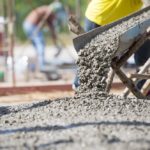News - Construction News
Innovative new ‘green’ concrete developed

Scientists at the University of Exeter have made a break through in innovative construction techniques, by developing a new greener, stronger and more durable concrete.
Experts from the university have developed a pioneering nanoengineering technology, that the wonder-material graphene incorporated into concrete production.
The technique could revolutionise the construction industry, with the new composite material being more than twice as strong, and four times as water resistant, than existing concretes. The new material can be used directly by the construction industry on building sites, with all of the concrete samples tested to British and European standards.
Crucially, the new graphene-reinforced concentre material also drastically reduced the carbon footprint of conventional concrete production methods, making it more sustainable and environmentally friendly.
The research team insist the new technique could pave the way for other nanomaterials to be incorporated into concrete, and so further modernise the construction industry worldwide.
Professor Monica Craciun, co-author of the paper and from Exeter’s engineering department, said: “Our cities face a growing pressure from global challenges on pollution, sustainable urbanization and resilience to catastrophic natural events, amongst others.
“This new composite material is an absolute game-changer in terms of reinforcing traditional concrete to meets these needs. Not only is it stronger and more durable, but it is also more resistant to water, making it uniquely suitable for construction in areas which require maintenance work and are difficult to be accessed .
“Yet perhaps more importantly, by including graphene we can reduce the amount of materials required to make concrete by around 50% – leading to a significant reduction of 446kg/tonne of the carbon emissions.
“This unprecedented range of functionalities and properties uncovered are an important step in encouraging a more sustainable, environmentally-friendly construction industry worldwide.”
Previous work on using nanotechnology has concentrated on modifying existing components of cement, one of the main elements of concrete production. In the innovative new study, the research team has created a new technique that centres on suspending atomically thin graphene in water with high yield and no defects, low cost and compatible with modern, large scale manufacturing requirements.
Dimitar Dimov, the lead author, added: “This ground-breaking research is important as it can be applied to large-scale manufacturing and construction. The industry has to be modernised by incorporating not only off-site manufacturing, but innovative new materials as well.
“Finding greener ways to build is a crucial step forward in reducing carbon emissions around the world and so help protect our environment as much as possible. It is the first step, but a crucial step in the right direction to make a more sustainable construction industry for the future.”
The paper, Ultrahigh Performance nanoengineered Graphene-Concrete Composites for Multifunctional Applications, is published in the journal Advanced Functional Materials, and supported by the UK’s Engineering and Physical Sciences Research Council (EPSRC).
If you would like to read more articles like this then please click here.
Related Articles
More News
- Building the next generation
17 Jul 25
We are facing a skills crossroads in our industry, says Richard Martin, Managing Director, Churngold
- Plan to kickstart onshore wind revolution
17 Jul 25
Onshore wind is set to accelerate over the second half of the decade.
- Homes England supports Greencore Homes with new sustainable homes
16 Jul 25
Homes England will provide funding to support the delivery of Milton Heights.






